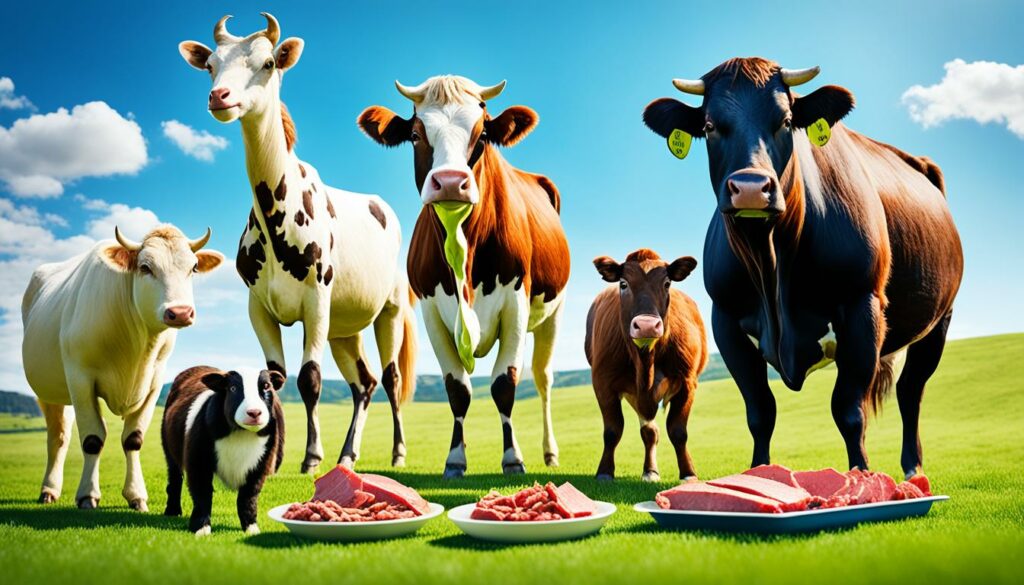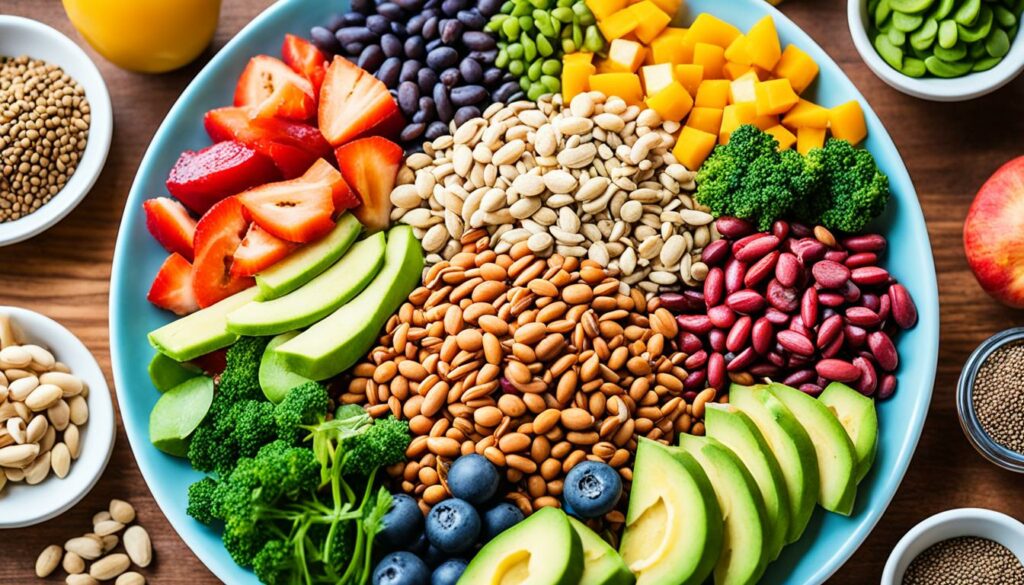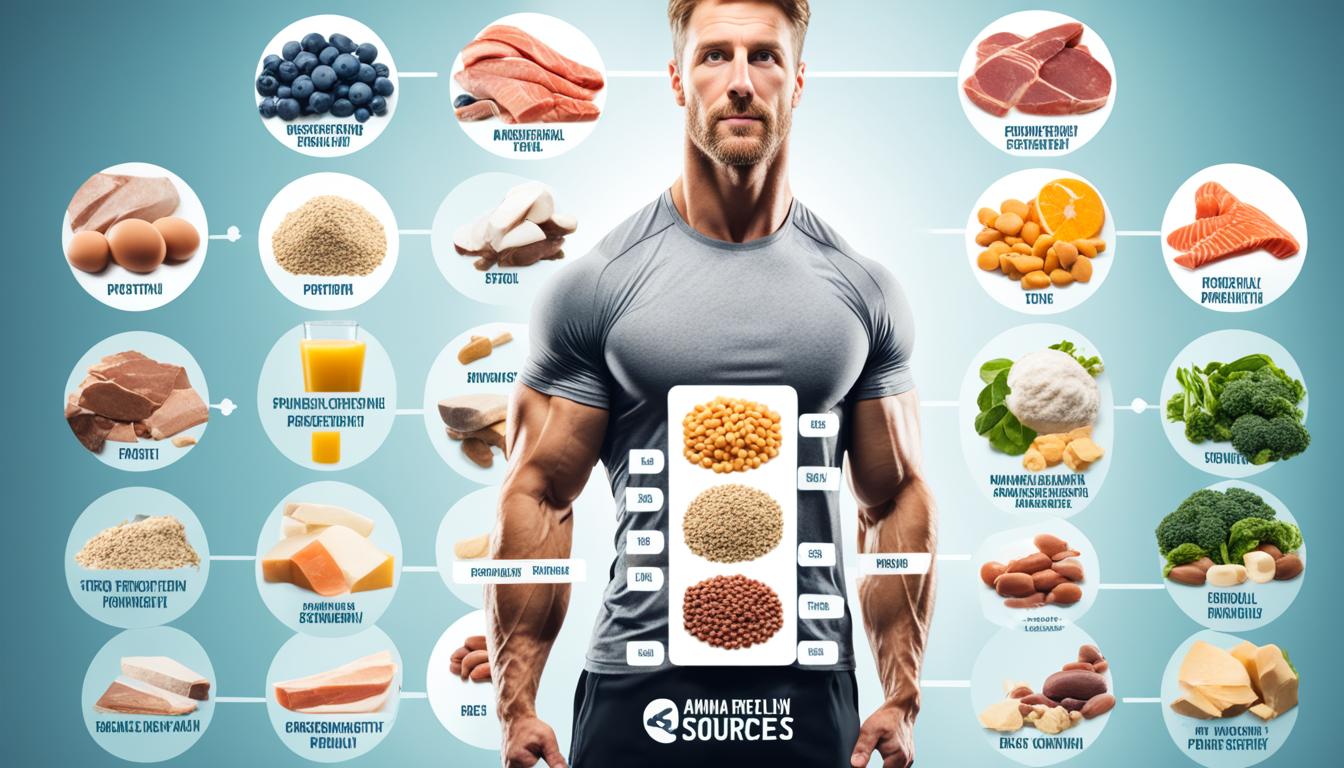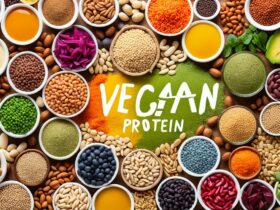Welcome to our comprehensive guide on animal protein! In this section, we will delve into the definition, benefits, and importance of animal protein in our diet. Whether you’re curious about the differences between animal and plant protein or looking for reliable sources of animal protein, we’ve got you covered with the latest research and expert insights.
Key Takeaways:
- Animal proteins are complete proteins that contain all essential amino acids, making them a valuable part of a balanced diet.
- Diets rich in plant protein have been associated with lower risks of stroke, heart disease, and early death.
- Animal protein sources include dairy, poultry, beef, pork, and eggs, while plant protein sources encompass nuts, seeds, whole grains, legumes, and vegetables.
- While animal protein can provide key nutrients, it should be consumed in moderation and complemented with plant-based foods for optimal health.
- Choosing lean animal protein sources, such as poultry and fish, is recommended for better health outcomes.
Animal Protein vs Plant Protein: The Key Differences
When it comes to protein, the sources we choose can have a significant impact on our overall health and well-being. Animal protein and plant protein are two main categories that differ in various aspects, from their composition to their potential health effects. Let’s explore the key differences between animal protein and plant protein, and how they can both contribute to a balanced diet.
Complete vs Incomplete Proteins
One of the primary distinctions between animal protein and plant protein is their completeness. Animal proteins are considered complete proteins as they contain all the essential amino acids that our bodies need. These essential amino acids are not produced by the body and must be obtained from our diet.
In contrast, many plant proteins are incomplete, meaning they lack one or more essential amino acids. However, by combining different plant protein sources, such as nuts, seeds, whole grains, legumes, and vegetables, individuals can ensure they receive all the essential amino acids their bodies require.
Animal Protein Sources
Animal proteins are derived from various sources, including dairy products, poultry, beef, pork, and eggs. These sources provide high-quality proteins, essential for muscle growth, tissue repair, and overall body function. However, it is essential to make wise choices within this category, opting for lean cuts of meat and low-fat dairy products to support a healthy lifestyle.
Plant Protein Sources
Plant-based protein can be found in a wide range of sources, such as nuts, seeds, whole grains, legumes, and vegetables. While individual plant proteins may be incomplete, consuming a diverse range of these sources can provide all the essential amino acids necessary for optimum health. In addition to protein, plant-based foods also supply essential nutrients, fiber, and antioxidants that promote overall well-being.
“Plant-based protein provides nutrients, fiber, and antioxidants that improve overall health.”
By including plant proteins in our diet, we can enjoy the benefits of a nutrient-rich, fiber-filled, and antioxidant-packed approach to nourishment.
| Animal Protein | Plant Protein |
|---|---|
| Complete proteins with all essential amino acids | May be incomplete, but combining sources can provide all essential amino acids |
| Sources include dairy, poultry, beef, pork, and eggs | Sources include nuts, seeds, whole grains, legumes, and vegetables |
| Provides high-quality proteins | Offers additional nutrients, fiber, and antioxidants |
As shown in the table above, animal protein and plant protein have distinct characteristics. Animal proteins offer complete amino acids and high-quality proteins, while plant proteins provide a wide range of nutrients, fiber, and antioxidants.
When it comes to determining the ideal protein sources for an individual, it is essential to consider personal health goals, dietary preferences, and overall well-being. A balanced diet that incorporates both animal and plant proteins can provide a comprehensive array of nutrients necessary for optimal health.
The Benefits of Animal Protein Intake
Animal protein can play a crucial role in our diets, as it provides essential nutrients that support various bodily functions. However, it is important to consume animal protein in moderation and balance it with plant-based foods to promote overall health and well-being.
Low-fat animal protein sources such as poultry and fish offer numerous health benefits. They are rich in high-quality proteins, vitamins, and minerals that are necessary for building and repairing tissues, producing enzymes and hormones, and maintaining a healthy immune system. These lean animal protein sources also provide omega-3 fatty acids, which have been linked to reduced inflammation and improved cardiovascular health.
Eating unprocessed and processed red meat, on the other hand, has been associated with an increased risk of premature death. Studies have shown that excessive consumption of red meat, especially processed varieties like bacon and sausages, may contribute to higher rates of heart disease, stroke, and certain types of cancer.
“Choosing low-fat animal protein sources like poultry and fish can provide essential nutrients, while minimizing the potential health risks associated with red meat consumption.”

It’s important to note that animal protein alone does not guarantee optimal health. A balanced diet that incorporates a variety of plant-based foods is key. Plant-based foods not only offer their own unique health benefits but also provide crucial nutrients like fiber, antioxidants, and phytochemicals that can enhance overall well-being.
By adopting a balanced approach to protein consumption, we can maximize the benefits of animal protein while minimizing potential health risks. Incorporating lean animal protein sources in moderate amounts and complementing them with a wide range of plant-based foods can help us achieve a well-rounded and nutritious diet that supports our long-term health goals.
| Benefits of Animal Protein Intake |
|---|
| Provides essential nutrients for bodily functions |
| Supports tissue repair and maintenance |
| Boosts the immune system |
| Rich in high-quality proteins, vitamins, and minerals |
| Offers omega-3 fatty acids for cardiovascular health |
| Reduces the risk of inflammation-related diseases |
| Should be consumed in moderation |
| Balance with plant-based foods for overall health |
The Importance of Plant Protein in a Balanced Diet
A plant-based diet has gained popularity due to its numerous health benefits. Research has shown that plant-based diets have been linked to a lower risk of heart disease, stroke, cancer, and type 2 diabetes. By incorporating plant proteins into your diet, you can improve your overall well-being and reduce the risk of chronic diseases.
One of the key advantages of plant proteins is their rich content of phytochemicals, which are natural compounds found in plants. These phytochemicals have been found to have antioxidant and anti-inflammatory properties, and they also play a role in preventing cancer. By consuming plant-based proteins, you can take advantage of these protective effects and promote your long-term health.
Additionally, plant proteins are a great source of fiber, which is important for maintaining a healthy digestive system and preventing constipation. Fiber also helps regulate blood sugar levels, lower cholesterol levels, and promote weight management. By including a variety of plant-based foods in your diet, you can ensure an adequate intake of fiber and reap these health benefits.
It’s important to note that plant proteins can provide all the essential amino acids, although some plant-based proteins may be incomplete on their own. However, by combining different plant protein sources, such as nuts, seeds, whole grains, legumes, and vegetables, you can obtain a complete amino acid profile. Embracing a diverse range of plant-based foods ensures that you receive all the necessary nutrients for optimal health.
To help you understand the importance of plant protein in a balanced diet, here is a table showcasing some common plant protein sources and their nutritional profiles:
| Plant Protein Source | Protein Content (per 100g) | Fiber Content (per 100g) | Key Nutrients |
|---|---|---|---|
| Almonds | 21g | 12g | Vitamin E, Magnesium |
| Quinoa | 14g | 2.7g | Fiber, Iron |
| Lentils | 9g | 8g | Fiber, Folate |
| Chickpeas | 19g | 7.6g | Fiber, Iron |
| Spinach | 2.9g | 2.2g | Vitamin A, Vitamin K |
By diversifying your plant protein sources and incorporating these nutrient-rich foods into your diet, you can harness the health benefits of plant-based proteins and contribute to a well-rounded, balanced eating plan.

Sources of Animal Protein
When it comes to incorporating animal protein into your diet, there are several sources to choose from. These sources provide complete proteins, meaning they contain all essential amino acids needed by the body for optimal functioning.
Here are some common sources of animal protein:
| Source | Nutritional Benefits |
|---|---|
| Dairy Products | Rich in calcium, vitamin D, and protein |
| Poultry | Low in saturated fat and a good source of lean protein |
| Beef | Contains important nutrients such as iron and vitamin B12 |
| Pork | A good source of protein, zinc, and B vitamins |
| Eggs | Provide high-quality protein, vitamins, and minerals |
Choosing lean sources of animal protein, such as poultry and fish, is recommended for better health outcomes. These options are lower in saturated fat and provide essential nutrients without the drawbacks associated with higher-fat animal protein sources.
Remember, moderation is key when consuming animal protein. It’s important to balance your diet with plant-based foods to ensure overall health and well-being.
Sources of Plant Protein
Plant protein sources offer a diverse range of options when it comes to meeting our protein needs. Incorporating a variety of plant-based foods into our diets ensures a well-rounded intake of essential amino acids and other nutrients.
Nuts and seeds are excellent sources of plant protein. They are versatile and can be easily incorporated into meals or consumed as snacks. Almonds, walnuts, chia seeds, and flaxseeds are just a few examples that provide a good amount of protein.
Whole grains, such as quinoa, brown rice, and oats, are not only high in fiber but also contain a fair amount of plant protein. Including these grains in our meals adds nutritional value and helps increase protein intake.
Legumes, including beans, lentils, and chickpeas, are rich in protein, making them an essential part of plant-based diets. They are also a great source of fiber, vitamins, and minerals, making them an excellent choice for overall health.
Including a variety of vegetables in our meals is another way to add plant protein. Vegetables like broccoli, spinach, peas, and Brussels sprouts are not only loaded with nutrients but also contain modest amounts of protein.
To ensure a complete protein profile, it’s essential to combine different plant protein sources. For instance, pairing legumes with whole grains or nuts and seeds creates a complementary mix of amino acids, resulting in a complete protein meal.
Health Effects of Animal and Plant Protein
When it comes to the health effects of protein, both animal and plant sources play important roles in our diet. However, there are differences in how these proteins impact our overall health.
Animal Protein Health Effects:
Animal protein, especially from processed red meat, has been linked to an increased risk of cardiovascular disease. Studies have shown that higher consumption of red and processed meats can lead to elevated levels of cholesterol and triglycerides, which are risk factors for heart disease.
Plant Protein Health Effects:
On the other hand, plant protein intake has been associated with various health benefits. Research suggests that including plant-based proteins in your diet can lower the risk of heart disease, diabetes, and obesity. Plant proteins are generally lower in saturated fat and cholesterol compared to animal proteins, making them a healthier choice for overall heart health.
In addition, plant proteins are rich in fiber, antioxidants, and phytochemicals, which have been shown to reduce inflammation and improve overall health. These nutrients help support a healthy digestive system, promote satiety, and can even lower the risk of certain cancers.
It is important to note that both types of protein can have positive health effects when consumed in moderation. A balanced diet that includes a combination of animal and plant proteins can provide the necessary nutrients for optimal health and well-being.
| Animal Protein | Plant Protein | |
|---|---|---|
| Cardiovascular Health | Increased risk of cardiovascular disease, especially with high consumption of processed red meat | Lower risk of heart disease and improved heart health |
| Weight Management | No significant advantage in weight management | Can aid in weight loss and maintenance due to high fiber content |
| Cancer Prevention | No significant advantage in cancer prevention | Contains phytochemicals and antioxidants that may lower the risk of certain cancers |
| Overall Health | May provide essential nutrients but should be consumed in moderation | Provides a wide range of nutrients, fiber, and antioxidants for overall health benefits |
It is recommended to prioritize lean animal protein sources, such as poultry, fish, and low-fat dairy products, while also incorporating a variety of plant-based protein sources, such as nuts, seeds, legumes, and whole grains, into your diet.
Quote: “A well-balanced diet that includes both animal and plant proteins can provide the necessary nutrients for optimal health and well-being.”
Conclusion
Consuming a balanced diet that includes both animal and plant proteins is essential for overall health. Animal protein provides essential nutrients, contributing to the proper functioning of the body. However, it is crucial to consume animal protein in moderation, as excessive intake can have adverse health effects.
On the other hand, plant protein from a variety of sources offers numerous health benefits and helps reduce the risk of chronic diseases. Plant-based diets have been linked to lower rates of heart disease, stroke, cancer, and diabetes. Including a diverse range of plant-based foods in the diet ensures an adequate intake of nutrients and fiber.
To optimize health, it is recommended to focus on a well-rounded, diverse diet that combines both animal and plant proteins. This approach ensures a wide range of essential nutrients and amino acids, promoting overall well-being. By incorporating a variety of animal and plant protein sources, individuals can meet their protein needs while reaping the benefits of a balanced diet.
Plant Protein vs Animal Protein: The Complete Comparison Guide
FAQ
What is animal protein?
Animal protein refers to proteins that are sourced from animals. They are considered complete proteins as they contain all essential amino acids required by the human body.
What are the benefits of animal protein?
Animal protein provides essential nutrients and amino acids that support muscle growth, repair tissues, and maintain overall health. It is also a good source of iron, vitamin B12, and other essential minerals.
What are the sources of animal protein?
Animal protein can be found in dairy products, poultry, beef, pork, and eggs. These sources offer complete proteins with all essential amino acids.
Is animal protein better than plant protein?
Animal protein is considered complete, while many plant proteins are incomplete. However, both types of protein have their own benefits. It is recommended to consume a balanced diet that includes both animal and plant proteins.
What is the importance of plant protein in a balanced diet?
Plant protein plays a crucial role in a balanced diet as it provides fiber, antioxidants, and phytochemicals that are beneficial for overall health. Plant-based diets have been linked to lower risk of heart disease, stroke, cancer, and diabetes.
What are the sources of plant protein?
Plant protein can be found in nuts, seeds, whole grains, legumes, and vegetables. While many plant proteins are incomplete on their own, combining different plant-based sources can provide all essential amino acids.
What are the health effects of animal and plant protein?
Consuming animal protein, especially from processed red meat, has been associated with increased risk of cardiovascular disease. On the other hand, plant protein intake has been linked to lower risk of heart disease, diabetes, and obesity.











